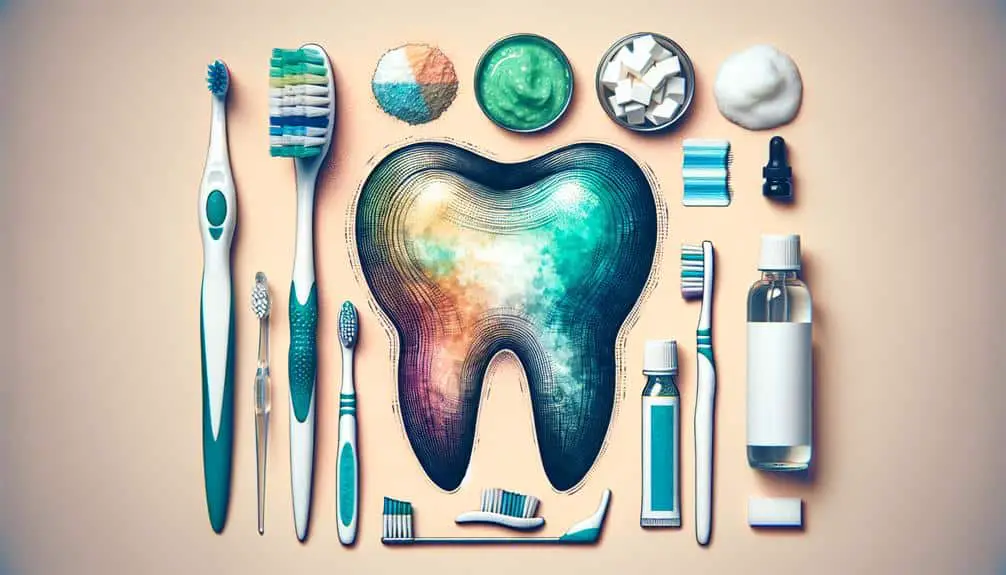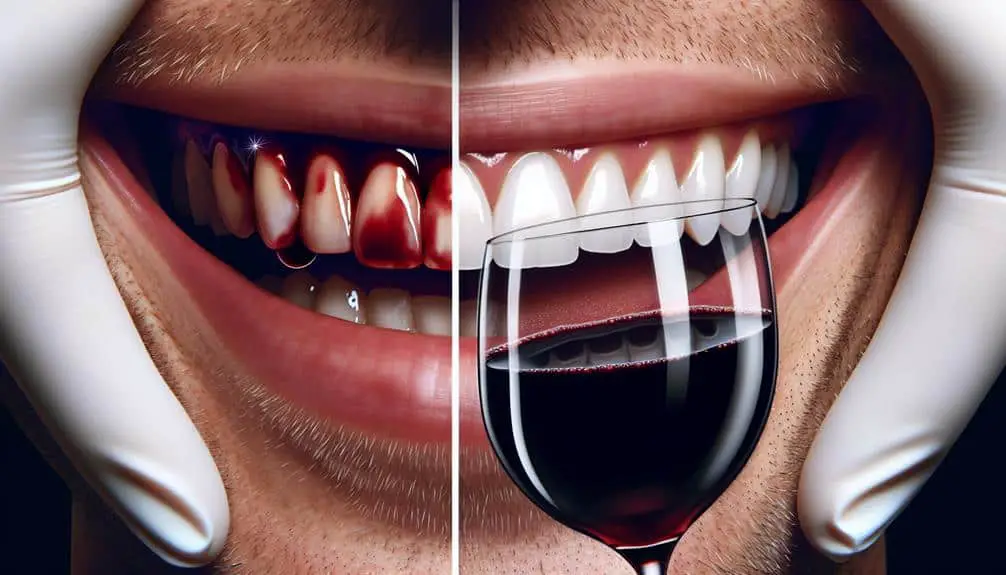To remove enamel stains effectively, try oil pulling with coconut oil for 15-20 minutes daily. Create a paste with baking soda and lemon occasionally to gently scrub surface stains. Experiment with an activated charcoal scrub by brushing teeth with the paste for 2 minutes. Consider using a turmeric mouthwash rinse for a natural approach to fighting bacteria and plaque. Dilute apple cider vinegar with water for rinsing a few times a week to help remove stains and kill bacteria. Restore your smile's shine with these methods. Additional tips await for enhancing your oral care routine.
Key Points
- Oil pulling with coconut oil for 15-20 minutes helps remove enamel stains.
- Make a paste with baking soda and lemon for a natural whitening treatment.
- Use activated charcoal scrub to absorb surface stains gently.
- Try a turmeric-infused mouthwash rinse for its anti-inflammatory properties.
- Dilute apple cider vinegar to remove stains and kill bacteria.
Oil Pulling for Enamel Stains
To effectively remove enamel stains, consider incorporating oil pulling as a natural remedy. Oil pulling involves swishing coconut oil around in your mouth, which can help lift stains from the enamel surface. Coconut oil has antimicrobial properties that may benefit oral health. When using this method, make sure to swish the oil around your mouth for about 15-20 minutes before spitting it out. It's crucial to recognize that oil pulling shouldn't replace regular brushing and flossing but can be used as a supplementary technique to help combat enamel stains.
If you find the taste or texture of coconut oil unpleasant, you can also explore herbal mouthwash alternatives. Some herbal mouthwashes contain ingredients like peppermint, tea tree oil, or spearmint, which can freshen breath and contribute to overall oral hygiene. These options can be a revitalizing change from traditional mouthwashes and may assist in reducing enamel stains when used in conjunction with a good oral care routine.
Baking Soda and Lemon Paste
Consider creating a paste using baking soda and lemon as a natural way to help remove enamel stains effectively. DIY whitening treatments often include this simple yet powerful combination due to their natural stain-fighting properties.
Baking soda, known for its mild abrasiveness, helps scrub away surface stains on teeth. Lemon, with its citric acid, acts as a natural bleaching agent. When combined, these ingredients form a paste that can aid in brightening your smile.
To create this paste, mix a small amount of baking soda with freshly squeezed lemon juice until it forms a smooth consistency. Be cautious with the lemon juice as its acidity can be harsh on enamel if used excessively. Once you have the paste ready, apply it to your toothbrush and gently brush your teeth for about two minutes. Rinse thoroughly to remove all traces of the paste.
While this method can be effective, it's crucial to use it sparingly to prevent damage to the enamel. These natural stain remedies can be a valuable addition to your oral care routine when used mindfully.
Activated Charcoal Scrub
For a different approach to removing enamel stains, explore the benefits of an activated charcoal scrub. Activated charcoal has gained popularity in dental care due to its ability to bind to toxins and stains, aiding in their removal. When used as a scrub, activated charcoal can help eliminate surface stains on teeth caused by coffee, tea, or other pigmented foods.
To create a DIY toothpaste recipe using activated charcoal, mix a small amount of activated charcoal powder with water to form a paste. Gently brush your teeth with this paste for 2 minutes, then rinse thoroughly. The charcoal particles work to absorb surface stains, leaving your teeth looking brighter.
Activated charcoal is often praised for its natural teeth whitening properties. It's a gentle yet effective alternative to harsh chemical whitening treatments. Remember to use activated charcoal scrubs in moderation, as excessive use may erode enamel over time. Incorporating this natural remedy into your oral care routine can help maintain a brighter smile without the use of synthetic chemicals.
Turmeric Mouthwash Rinse
Enhance your oral care routine with a turmeric-infused mouthwash rinse to promote dental health and combat enamel stains. Turmeric, known for its anti-inflammatory and antimicrobial properties, offers a natural solution to maintain oral hygiene. When used as a mouthwash, turmeric can help reduce plaque, fight bacteria, and soothe gum inflammation. Its benefits extend beyond oral health, contributing to overall well-being.
As an alternative to commercial mouthwashes that may contain artificial ingredients, turmeric offers a more natural and holistic approach. Mixing turmeric powder with warm water creates a simple yet effective mouthwash that can be used daily. Swish the mixture in your mouth for about 30 seconds before spitting it out. Be cautious as turmeric can stain surfaces, including clothing and countertops, so make sure to rinse your mouth thoroughly after use.
Incorporating turmeric mouthwash rinse into your oral care routine can be a beneficial way to support healthy teeth and gums while combating enamel stains naturally.
Apple Cider Vinegar Rinse
To effectively combat enamel stains and promote oral health, incorporating an apple cider vinegar rinse into your routine can provide natural benefits. Apple cider vinegar is known for its antibacterial properties and acidity levels that can help remove stains and kill bacteria in the mouth.
Here are some oral hygiene tips and natural remedies to make the most of this solution:
- Dilute Properly: Mix one part apple cider vinegar with two parts water to reduce its acidity and prevent potential damage to tooth enamel.
- Use Sparingly: Limit the frequency of apple cider vinegar rinses to a few times a week to avoid overexposure to acid, which can erode enamel over time.
- Follow with Water: After rinsing with apple cider vinegar, rinse your mouth with water to help neutralize the acidity and protect your teeth.
Frequently Asked Questions
Are There Any Specific Types of Enamel Stains That These Methods Are More Effective For?
For coffee, wine, tea, and smoking stains, specific methods like professional dental cleanings or whitening treatments tailored to each stain type can be more effective. Consult your dentist to determine the best approach.
How Often Should These Methods Be Used to See Noticeable Results in Removing Enamel Stains?
For best results in removing enamel stains, the frequency of usage is key. Consistent use of the methods recommended can yield noticeable improvements. Aim for regular application to see the most favorable outcomes in stain removal.
Are There Any Potential Risks or Side Effects Associated With Using These Natural Remedies for Enamel Stains?
When using natural remedies for enamel stains, be mindful of potential risks and side effects. Check effectiveness, frequency of use, and compatibility with professional treatments. Monitor speed of results for best outcomes and consult dental professionals if needed.
Can These Methods Be Used in Conjunction With Professional Teeth Whitening Treatments for Better Results?
When combining methods, consult professionals for best results. Professional guidance guarantees effectiveness and safety. Integrating natural remedies with professional teeth whitening treatments can enhance outcomes. Seek advice for a thorough and tailored approach to enamel stain removal.
How Long Does It Typically Take to See Results From Using These Natural Remedies for Removing Enamel Stains?
To see results from natural remedies for enamel stains, consistency is key. With good oral hygiene and enamel protection, incorporating proper brushing techniques and watching dietary habits, you may notice improvements within a few weeks.



